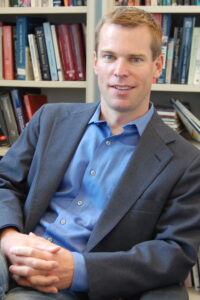Translating single-cell microfluidics from academic lab to global biotech impact
We’re honoured to welcome Dr Carl Hansen, CEO & Co-Founder of AbCellera, for a special research seminar
Events
Calendar

- This event has passed.
Research Seminar: Building a Mind for Cancer – Trey Ideker
January 11, 2024 @ 11:00 am - 12:00 pm PST
Research Seminar: Building a Mind for Cancer – Trey Ideker
Talk Summary:
Most drugs entering clinical trials fail, often related to an incomplete understanding of the mechanisms governing drug response. Machine learning techniques hold immense promise for better drug response predictions, but most have not reached clinical practice due to their lack of interpretability and their focus on monotherapies. To address these challenges I will describe development of DrugCell, an interpretable deep learning model of human cancer cells trained on the responses of thousands of tumor cell lines to thousands of approved or exploratory therapeutic agents. The structure of the model is built from a knowledgebase of molecular pathways important for cancer, which can be drawn from literature or formulated directly from integration of data from genomics, proteomics and imaging. Based on this structure, alterations to the tumor genome induce states on specific pathways, which combine with drug structure to yield a predicted response to therapy. The key pathways in capturing a drug response lead directly to design of synergistic drug combinations, which we validate systematically by combinatorial CRISPR, drug-drug screening in vitro, and patient-derived xenografts. We also explore a recently developed technique, few-shot machine learning, for training versatile neural network models in cell lines that can be tuned to new contexts using few additional samples. The models quickly adapt when switching among different tissue types and in moving to clinical contexts, including patient-derived xenografts and clinical samples. These results begin to outline a blueprint for constructing interpretable AI systems for predictive medicine.

Dr. Trey Ideker | Department of Medicine; University of California San Diego
Dr. Ideker biography:
Trey Ideker, PhD, is a 20-year Professor of Medicine, Bioengineering and Computer Science, and former Chief of Genetics, at the University of California San Diego (UCSD). Additionally, he is Director or Co-Director of the Bridge2AI Functional Genomics Data Generation Program, the Cancer Cell Map Initiative, the National Resource for Network Biology, and the UCSD Graduate Program in Bioinformatics and Systems Biology, all NIH-funded efforts. Ideker received BS and MEng degrees in Computer Science from MIT and a PhD in Genome Sciences from the University of Washington under Drs. Lee Hood and Dick Karp. He was then a David Baltimore Fellow at the Whitehead Institute before joining the UCSD faculty in 2003. Presently, Ideker serves on the Board of Scientific Advisors to the NIH National Cancer Institute and, formerly, to the National Human Genome Research Institute. He also serves on the editorial boards of Cell, Cell Systems, PLoS Computational Biology, and Molecular Systems Biology. He was named a Top 10 Innovator by Technology Review, received the 2009 ICSB Overton Prize, and is a Fellow of the AAAS, AIMBE and ISCB organizations. Since 2020 he has been named a Web of Science Highly Cited Researcher (top 1% by citations). Ideker’s research laboratory has led seminal studies establishing the theory and practice of systems biology, including systematic techniques for elucidating human cell architecture and its molecular networks. From 2001–present, his laboratory produced numerous maps of protein-protein, transcriptional, and genetic networks in model organisms and humans (in collaboration with trainees and co-investigators), along with widely used Cytoscape network analysis software (with Gary Bader and others). His studies introduced core concepts in bioinformatics, including generation of transcriptional networks to explain genome-wide expression patterns (with Leroy Hood), network alignment and evolutionary comparison (with Richard Karp and Roded Sharan), and network biomarkers, which enable multigenic definitions of patient subtypes and treatment responses. He also introduced experimental mapping techniques, including synthetic-lethal interaction mapping with CRISPR/Cas9 (with Prashant Mali) and characterization of differential interactions across conditions and time (with Nevan Krogan). These technologies have broadly informed the mechanisms by which diverse genetic alterations drive cancer, neurological disorders, and drug resistance. Recently, Ideker and Emma Lundberg demonstrated an end-to-end pipeline for mapping the structure of human cells over a broad scale range (10–9 to 10–5 m) based on fusion of protein networks with immunofluorescence imaging. Ideker has also recently shown that network maps provide a substrate for deep learning models of cell structure and function, with basic implications for the construction of intelligent systems in precision medicine (with Jianzhu Ma and co-investigators). Finally, Ideker and collaborators showed that large parts of the methylome are remodeled with age, leading to the first epigenetic clock and the rapidly expanding field of epigenetic aging.